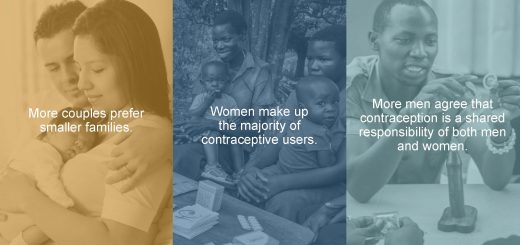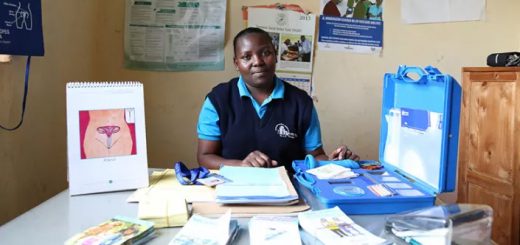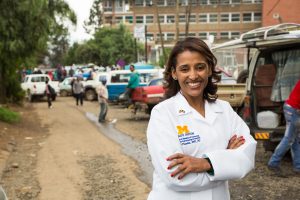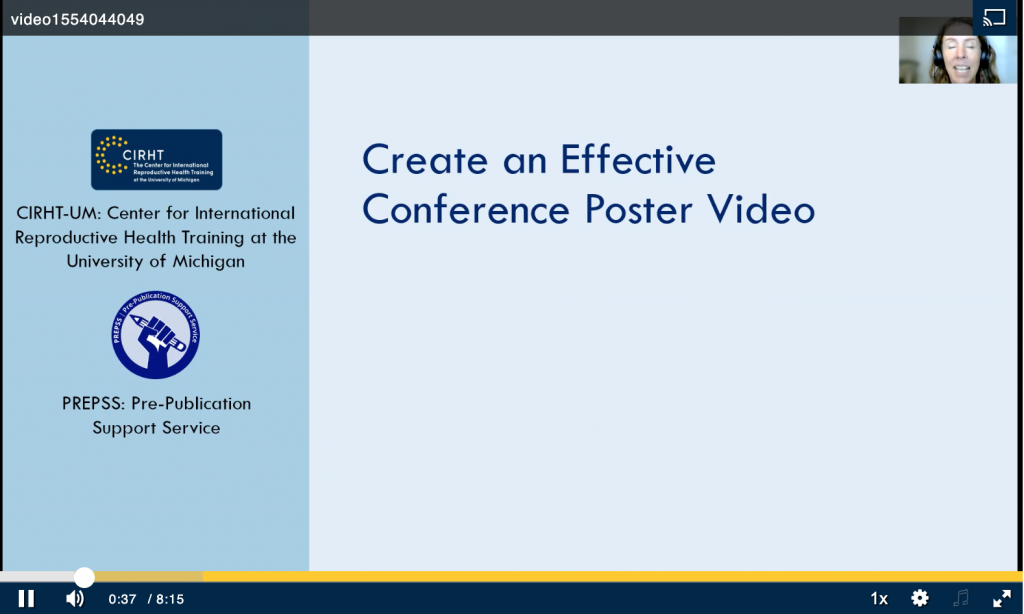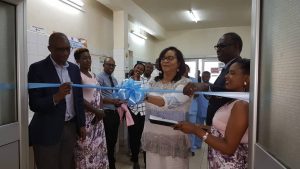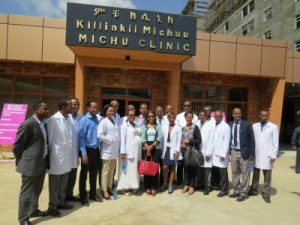News Review – 23 June 2017
Midwives in Toronto, global RH HR needs
“Maternal mortality is the highest health inequity in the world, and midwives are the best-skilled birth attendants who can save the lives of mothers and children during childbirth,” according to Jakaya Kikwete, former president of Tanzania,and Toyin Saraki of the Wellbeing Foundation in opening remarks at the triennial International Conference of Midwives Congress in Toronto, attended by more than 4,200 midwives from 113 countries. The conference looked at the need for more training and better conditions for midwifery, which “is a calling, not just a profession.”
Midwives are among those mentioned in a study of the need for human resources for sexual, reproductive, maternal and newborn health in 41 sub-Saharan countries, which concludes that “based on the current and projected potential met need in the future, the countries were grouped into three categories: (1) ‘making or maintaining progress’: 14 countries including Ghana, Senegal and South Africa, (2) ‘at risk’: 6 countries including Gabon, Rwanda and Zambia, and (3) ‘low performing’: 21 countries including Burkina Faso, Eritrea and Sierra Leone.”
Abortion statistics, debates, stigma and misinformation
An important release from the WHO’s Human Reproduction Programme: The Global Abortion Policies Database, which “is designed to strengthen global efforts to eliminate unsafe abortion,” with updated, factual information.
The WHO initiative is important because, as a New England Journal of Medicine essay on “alternative science” states: Human reproduction has become the victim of alternative science, rife with alternative definitions of well-understood medical conditions and characterized by rejection of the scientific method as the standard for generating and evaluating evidence.”
The debate on abortion laws continues across Africa; in Zimbabwe, where it’s clear that women suffer from the arcane laws; in Uganda, interpretations of the country’s laws vary from district to district, leading to confusion among women and poor medical choices; and in Ghana one region is experiencing a rise in unsafe abortion among teenagers. The US debate continues as well, as the new Trumpcare bill threatens women’s access to healthcare, even restricting abortion coverage even in private insurance. On the international front, the US rejected a UN resolution on violence against women due to an abortion clause.
One of the oft-cited arguments against abortion is the prevalence of regret and depression amongst those who have had one, which is debunked in an analysis in Psychological Medicine: “In a nationally representative, longitudinal dataset, there was no evidence that young women who had abortions were at increased risk of subsequent depressive symptoms compared with those who give birth after an unwanted first pregnancy.”
Contraceptive access, teen pregnancy
South Africa announced a policy to allow students as young as 12 to access contraceptives at school, while calls for more availability were also in the press in Uganda. Kenya was an early proponent of contraception, and managed to reduce its fertility rate from just over 8 births per woman in 1960 to just over 4 per woman in 2015. In Tanzania, while the government calls family planning the “sure pathway to poverty reduction”, President John Magufuli declared that schoolgirls who have given birth will not be allowed back in the classroom.
Teen pregnancy alarms are also sounding in Rwanda, Namibia, Kenya and Ghana.
World Refugee Day
A record 65 million people are refugees. As FP2020 reports: “One-fourth of all refugees, displaced persons, and disaster victims are women and girls of reproductive age. They need more than food, water, and shelter; they need the ability to determine whether or not they get pregnant.” The Maternal Health Task Force re-released its useful list of resources about sexual, reproductive and maternal health care in humanitarian settings.
University of Michigan shout-outs!
Two shout-outs to University of Michigan colleagues: Our colleague, Global Health Coordinator and health sciences informationist Gurpreet Rana was given the T. Mark Hodges award by the Medical Library Association for her “outstanding individual achievement in promoting, enabling and delivering improvements in the quality of health information internationally.” (You can see her dedicated research guide for family planning and reproductive health on the CIRHT website: http://guides.lib.umich.edu/cirht.)
And Okeoma Mmeje, M.D. released a study which shows that “STD treatment for two” – allowing prescriptions for the patient as well as their partner who may not have been seen by a doctor – may be the most successful way treating and preventing STIs.
Complete News Review References:
General/Global
United Nations Population laureates commended for contribution to population and reproductive issues, Maravi Post, 23 Jun 2017
Increasing transparency of abortion laws and policies: launch of a new online database, WHO/HRP, 23 Jun 2017
Zeroing in on Trumpcare’s Impact on Reproductive Rights, Ms., 22 Jun 2017
US rejects UN resolution on violence against women due to abortion clause, The Independent, 22 Jun 2017
Inside a Planned Parenthood clinic where politics don’t matter, STAT News, 22 Jun 2017
The Senate health bill would hugely roll back women’s health care, Vox, 22 Jun 2017
Most U.S. teens have sex by 18, but pregnancies down: CDC study, Reuters, 22 Jun 2017
Celebrating one librarian’s commitment to global health, Elsevier, 22 Jun 2017
Zika May Have a Startlingly High Sexual Transmission Rate, Nova Next, 22 Jun 2017
WHO figure wrong: 11% of births in sub-Saharan Africa to teen mothers – not 50%, Africa Check, 21 Jun 2017
African Leaders and 4,200 Midwives Unite to Call for Urgent Global Policy Reform and Recognition to Help Save One Million Lives Per Year, ICM, 21 Jun 2017
Many women gain too much weight in pregnancy. How can we help?, STAT news, 21 Jun 2017
Abortion Coverage in Private Insurance Plans Under the American Health Care Act, KFF, 21 Jun 2017
Facility-Based Delivery Has Increased in Africa and Asia – Now What?, MHTF, 20 Jun 2017
What’s In Your Bag? Inside A Dignity Kit For Refugee Women, Universal Access Project via Huffington Post, 20 Jun 2017
On World Refugee Day, let’s talk about family planning, FP2020, 19 Jun 2017
Why These Religious Leaders Are Speaking Out For Planned Parenthood, Bustle, 19 Jun 2017
Midwives from 113 countries kick off convention with march through Toronto, The Star, 18 Jun 2017
From the Archives | Addressing Sexual, Reproductive and Maternal Health in Humanitarian Settings, MHTF, 16 Jun 2017
‘Midwifery is a calling, not just a profession’: childbirth stories around the world, The Guardian, 16 Jun 2017
Trump Doesn’t Care About HIV. We’re Outta Here, Newsweek, 16 Jun 2017
Hearing the true message of Trump’s proposed budget, PSI via Devex, 6 Jun 2017
STD Treatment for Two? Study Shows Patient Value, Cost Savings, U-M IHPI, 2 Jun 2017
Misconception, Educational Media Reviews Online, 16 May 2017
Academic
The importance of sexual and reproductive health and rights to prevent HIV in adolescent girls and young women in eastern and southern Africa, WHO/HRP, 23 Jun 2017
HIV is always with me: men living with perinatally acquired HIV and planning their families, Open Access Journal of Contraception, 21 Jun 2017
Abortion and subsequent depressive symptoms: an analysis of the National Longitudinal Study of Adolescent Health, Psychological Medicine, 19 Jun 2017
WHO Recommendations on Prevention and Treatment of Postpartum Haemorrhage and the WOMAN Trial, WHO/HRP, 15 Jun 2017
A Pre-Discharge Checklist for Improving Facility-Based Postnatal Care for Mothers and Newborns, MHTF, 15 Jun 2017
Design and initial implementation of the WHO FP umbrella project – to strengthen contraceptive services in the sub Saharan Africa, Reproductive Health, 15 Jun 2017
Alternative Science and Human Reproduction, NEJM, 14 Jun 2017
Quality of Care in the Context of Rights-Based Family Planning, Population Council, June 2017
Current and future availability of and need for human resources for sexual, reproductive, maternal and newborn health in 41 countries in Sub-Saharan Africa, International Journal for Equity in Health, 3 May 2017
DRC
Medical app aims to tackle rape, flag war crimes in conflict-torn Congo, Thomson Reuters Foundation, 14 Jun 2017
Ethiopia
Empowering Female Health Science Students in Ethiopia: A Case Study, Jhpiego, 20 Jun 2017
Ethiopia’s Community Health Workers Strengthen Skills and Improve Care Using Smartphones, Jhpiego via Semonegna, 16 Jun 2017
Ghana
More teenagers engage in unsafe abortion at Brohani – Midwife, News Ghana, 19 Jun 2017
Strengthen campaign against teenage pregnancy – Director of Health. News Ghana, 19 Jun 2017
Sustain momentum of the campaign to keep adolescents safe, Ghana News Agency, 19 Jun 2017
Ash Reg Health Directorate Scales Up Efforts In Preventing Adolescent Pregnancy, News Ghana, 18 Jun 2017
Kenya
Ministry: Number of teenage pregnancies in Narok at all-time high, Daily Nation, 22 Jun 2017
IKEA Foundation and CHAI Announce Grants Totaling $16.8 Million to Reduce Childhood Mortality in India and Kenya, CHAI, 21 Jun 2017
Uhuru signs law on free sanitary towels for schoolgirls, Business Daily, 21 Jun 2017
Maternal and baby health, scout for the best care available, Capital News, 19 Jun 2017
What birth control in 1970s Kenya and mobile phones today teach us, Quartz, 16 Jun 2017
Culture: Taking hostage of girl’s body, NAYA Kenya, 16 Jun 2017
Liberia
Why Young Women in Rural Parts of Liberia Are Not Involved in Decision Making, Front Page Africa, 20 Jun 2017
PPAL Call For End to Early and Forced Child Marriage, Front Page Africa, 20 Jun 2017
GA calls for halt to Female Genital Mutilation, New Dawn, 20 Jun 2017
Malawi
National Youth Council to hold youth symposium, Malawi News Agency, 19 Jun 2017
Magic of safe motherhood committees, Malawi News Agency, 18 Jun 2017
Namibia
Learners cautioned against teenage pregnancy, New Era, 19 Jun 2017
Nigeria
Group calls for laws in Nigeria against female genital mutilation, Premium Times, 23 Jun 2017
Rwanda
A Rwanda Where No Baby Dies During Birth, Rwanda Eye, 23 Jun 2017
Teenage pregnancies: We need to talk, The East African, 20 Jun 2017
Pelvic inflammatory disease: Untreated, the disease could cause infertility, New Times, 19 Jun 2017
Sierra Leone
One year after Ebola’s end, Sierra Leone’s midwives help mend health system, UNFPA via RelieWeb, 19 Jun 2017
South Africa
Condoms at school? Yes, says a new education policy, Bhekisisa, 14 Jun 2017
Tanzania
Use of family planning means up as more men get involved, The Citizen, 23 Jun 2017
Social media users react to JPM’s decision on teen mothers, The Citizen, 23 Jun 2017
JPM: No classroom for kid moms, Daily News, 23 Jun 2017
No plan to limit number of children a family can have, govt says, The Citizen, 23 Jun 2017
State pushes to boost maternal health services, Daily News, 22 Jun 2017
New health scheme targets moms and babies, Daily News, 22 Jun 2017
Family planning is ‘sure’ pathway to poverty reduction, Daily News, 21 Jun 2017
Zero maternal mortality on focus as 100 health centres on cards, Daily News, 21 Jun 2017
Governments called to improve midwifery conditions, The Citizen, 21 Jun 2017
Closing the Quality Gap, Karolinska Institutet, 20 Jun 2017
Why we need to value midwives, The Citizen, 19 Jun 2017
‘Action needed to attain family planning goals’ , Daily News, 17 Jun 2017
Uganda
Solutions to Abortion, NBS TV, 19 Jun 2017
Children petition parliament over contraceptives, The Observer, 17 Jun 2017
USA to provide family planning for adolescents, The Observer, 16 Jun 2017
Zimbabwe
Zim’s abortion dilemma: It’s the women who suffer, The Herald, 20 Jun 2017
A knotty dilemma, The Herald, 16 Jun 2017

